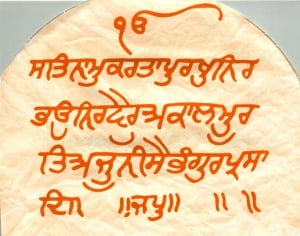Mool Mantar
The Mool Mantar
The Mool Mantar is the most important composition contained within the Sri Guru Granth Sahib; it is the basis of Sikhism. It’s importance is emphasised by the fact that it is the first composition to appear in the SGGS and that it appears before the commencement of most of the Raags within the SGGS.
The Mool Mantar is said to be the first composition uttered by Guru Nanak Dev ji upon enlightenment (see 3 days in the River) at the age of 30. Being the basis of Sikhism it encapsulate the entire theology of Sikhism, and as a result, it is also the most difficult composition to fully understand. The proceeding Japji Sahib and the rest of the SGGS totalling 1430 pages, are efforts to explain that which is contained within the Mool Mantar.
Ek Oankaar ੴ
Literally : There is only One God.
There is but one God, the Sole Supreme Being, the Ultimate Reality. The number one denotes that God is non-dual (advait). Bhai Gurdas writes, "By writing 1 (one) in the begining, it has been shown that EkOnakar, God, who subsumes all forms in Him is only One (and not two or three)" The number one also affirms His being a personality and not merely Shunya or void.
The negation of duality implies Absoluteness of God's Bring. Being Absolute, God cannot be comprehended by the mind. The mind is capable of knowing only those things, phenomena, facts and concepts which are bipolar or relative. God being Non-Dual and Absolute, is Unknowable to man's mind. A laymans example of this is in imagining distances: one could quite easily indicate that a metre in height is so high; even two or three metres. However when we come to large distances, one mile, or two miles it cannot be imagined by the mind, or fully comprehended and so a standard is used for comparison: this mountain is x miles highs, this tree is so high etc
The word 'O-ankaar' denotes that God manifests Himself ceaselessly throughout His Creation in diverse forms, features and colours, and in this way becomes knowable to man. But, in spite of manifesting Himself diversing, God remains One; He remains Immanent in His Creation, while at the same time remaining Transcendent. This God is at once One and Many implying Unity in Diversity. Kapur Singh suggests Oan = Transcedent, -kar = Immanent. The Mandukopanishad defines the word as: "That which was, is, will be, is all Onkar. And that which triple transcends is Onkar too."
Satnam | ਸਤਿਨਾਮ
In this Creation, all phenomena is an appearance and is ephemeral. Reality (Sat) is immanent in phenomena as 'Noumena' (Naam) - Noumena is from Greek meaning Bright Essence. Naam is the Essence of God pervading invisibly in His visible Creation. As God, being Formless and Absolute, is unknowable to man's mind, He reveals Himself to man through His Creation, which has both physical and metaphysical dimensions. For realising the metaphyical Reality pervading as Naam in his Creation, God's name, which is a spiritual notion of God adopted to our powers of perception and thought, is used as an appellation to invoke Him to reveal Himself to the devotee.
Karta Purakh | ਕਰਤਾ ਪਰਖ
God, the Supreme Being, Himself is the Creator (Kartaa), and being immanent in His Creation, is All Pervasive and fills all beings (Purakh). He is thus Omniscient, knowing eachs one's inner mind, and Omnipotent, doing everything everywhere - evoluting, sustaining, and involuting.
Nirbhao | ਨਿਰਭਉ
God is without fear: Origin of fear is possible only if there is another being besides Him. But, as God is Absolute, Himself immanent in all His Creation, whom is He to be afraid of? A corollary to this attribute, stated positively, is that God is all Bliss.
Nirvair | ਨਿਰਵੈਰ
God is without rancour or enmity; As God is the Sole Supreme Being, Himself immanent and pervasive in His Creation, against whom is He to have rancour, enmity, hatred or ill-will? A corollary to this attribute, stated positively, is that God is all Love.
Akaal Moorat | ਅਕਾਲ ਮੂਰਤਿ
God is a Being beyond time: An Eternal, Indestructible Entity.
Ajoonee | ਅਜੂਨੀ
God is Unborn, Uncreated, Beyond Incarnation: He Himself, being the Primal Being, no being prior to Him can be conceived.
Saibhang | ਸੈਭੰ
Self-illumined; He is from Himself, Self-existent, and Self-sufficient.
Gur Prasaad | ਗਰ ਪਰਸਾਦਿ
He is attained by the Grace of the Enlightener.
- Gur stands for Master; Spiritual Teacher; Guide;
- Prasaad means blessings; gift; Grace; 'Bakshish'
- With the Guru's Blessings
References
- Singh, Dr.Santokh (1990). English Transliteration and Interpretation of Nitnaym Baanees, Sikh Prayers for English Speaking Sikh Youth. Sikh Resource Centre. ISBN 1895471087.
- Singh, Dr.Gopal (1962). Guru-Granth Sahib Vol.1. Taplinger Publishing Co.. ISBN.
External Links
- To see the holy book in it original text follow this link: Gurbani.net
- To see the holy book in it original text with translation follow this link: Sikhi to the Max

